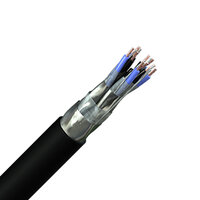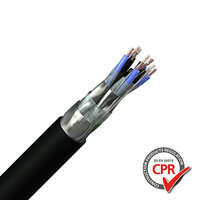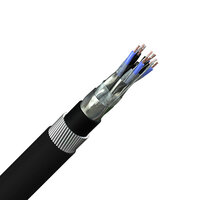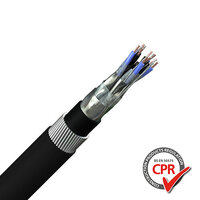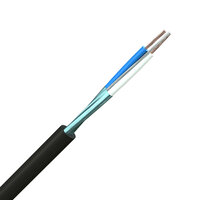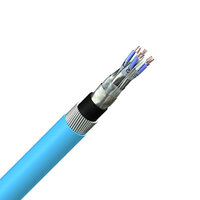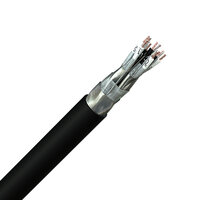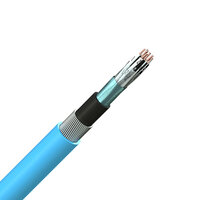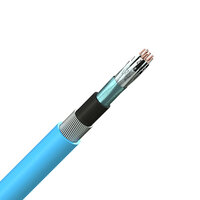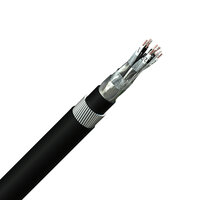

Elevate Your Industrial Processes
Precision Instrumentation Cables
Instrumentation cables play a crucial role in various industrial applications, providing a reliable means of transmitting signals and data between different instruments and control systems. These cables are specifically designed to meet the demanding requirements of industries such as petrochemical, pharmaceutical, and manufacturing, where precise and accurate signal transmission is essential for the efficient operation of processes.
One widely recognized standard for instrumentation cables is BS5308/PAS5308, which outlines specifications for their construction and performance. In particular, Part 1 of this standard distinguishes between Type 1 and Type 2 Instrumentation Cables, each tailored to specific environmental conditions and usage.
BS5308/PAS5308 Part 1 Type 1 Instrumentation Cables: Type 1 instrumentation cables are designed for use in indoor applications where exposure to moisture or corrosive substances is limited. These cables typically feature a PVC (Polyvinyl Chloride) insulation and a PVC or PE (Polyethylene) outer sheath. With their construction, Type 1 cables are suitable for a range of industrial settings, providing reliable signal transmission in less harsh environments.
BS5308/PAS5308 Part 1 Type 2 Instrumentation Cables: On the other hand, Type 2 instrumentation cables are engineered to withstand more challenging conditions, including exposure to oils, chemicals, and other corrosive substances. These cables often incorporate a LSZH (Low Smoke Zero Halogen) insulation and a LSZH or SWA (Steel Wire Armored) outer sheath, enhancing their resistance to environmental factors. Type 2 cables are well-suited for outdoor applications or installations where the cables may be exposed to harsh elements.
EN 50288-7 Instrumentation Cables: In addition to the BS5308/PAS5308 standard, the EN 50288-7 standard is another widely recognized specification for instrumentation cables. This European standard provides further guidelines on the construction and performance of these cables. EN 50288-7 emphasises the importance of meeting specific electrical and mechanical requirements to ensure the reliable transmission of signals in industrial environments.
Instrumentation cables, compliant with these standards, are integral components in the implementation of control and monitoring systems, contributing to the overall efficiency and safety of industrial processes. As technology advances, these standards continue to evolve, ensuring that instrumentation cables keep pace with the demands of modern industries.
Displaying 1 to 20 of 23
-
![BS-5308/PAS-5308-Part-1-Type-1-Instrumentation-Cable-Collective-Screen-Unarmoured-PVC-Grid-image]()
-
![BS-5308/PAS-5308-Part-1-Type-1-Instrumentation-Cable-Individual-&-Collective-Screen-Unarmoured-PVC-Grid-image]()
BS5308/PAS5308 Part 1 Type 1 Instrumentation Cable Individual & Collective Screen Unarmoured PVC
Code: G1486 -
![BS-5308/PAS-5308-Part-1-Type-1-Instrumentation-Cable-Collective-Screen-Unarmoured-LSHF-Grid-image]()
BS5308/PAS5308 Part 1 Type 1 Instrumentation Cable Collective Screen Unarmoured LSHF
Code: G1485 -
![BS-5308/PAS-5308-Part-1-Type-1-Instrumentation-Cable-Individual-&-Collective-Screen-Unarmoured-LSHF-Grid-image]()
BS5308/PAS5308 Part 1 Type 1 Instrumentation Cable Individual & Collective Screen Unarmoured LSHF
Code: G1488 -
![BS-5308/PAS-5308-Part-1-Type-2-Instrumentation-Cable-Collective-Screen-Armoured-PVC-Grid-image]()
BS5308/PAS5308 Part 1 Type 2 Instrumentation Cable Collective Screen Armoured PVC
Code: G1489 -
![BS-5308/PAS-5308-Part-1-Type-2-Instrumentation-Cable-Individual-&-Collective-Screen-Armoured-PVC-Grid-image]()
BS5308/PAS5308 Part 1 Type 2 Instrumentation Cable Individual & Collective Screen Armoured PVC
Code: G1491 -
![BS-5308/PAS-5308-Part-1-Type-2-Instrumentation-Cable-Collective-Screen-Armoured-LSHF-Grid-image]()
BS5308/PAS5308 Part 1 Type 2 Instrumentation Cable Collective Screen Armoured LSHF
Code: G1490 -
![BS-5308/PAS-5308-Part-1-Type-2-Instrumentation-Cable-Individual-&-Collective-Screen-Armoured-LSHF-Grid-image]()
BS5308/PAS5308 Part 1 Type 2 Instrumentation Cable Individual & Collective Screen Armoured LSHF
Code: G1492 -
![BS-5308/PAS-5308-Part-2-Type-1-Instrumentation-Cable-Collective-Screen-Unarmoured-PVC-Grid-image]()
BS5308/PAS5308 Part 2 Type 1 Instrumentation Cable Collective Screen Unarmoured PVC
Code: G1484 -
![BS-5308/PAS-5308-Part-2-Type-1-Instrumentation-Cable-Individual-&-Collective-Screen-Unarmoured-PVC-Grid-image]()
BS5308/PAS5308 Part 2 Type 1 Instrumentation Cable Individual & Collective Screen Unarmoured PVC
Code: G1487 -
![BS-5308/PAS-5308-Part-2-Type-2-Instrumentation-Cable-Collective-Screen-Armoured-PVC-Grid-image]()
BS5308/PAS5308 Part 2 Type 2 Instrumentation Cable Collective Screen Armoured PVC
Code: G1537 -
![BS-5308/PAS-5308-Part-2-Type-2-Instrumentation-Cable-Individual-&-Collective-Screen-Armoured-PVC-Grid-image]()
BS5308/PAS5308 Part 2 Type 2 Instrumentation Cable Individual & Collective Screen Armoured PVC
Code: G1538 -
![EN-50288-7-Instrumentation-Cable-Collective-Screen-Unarmoured-PVC-Grid-image]()
EN 50288-7 Instrumentation Cable Collective Screen Unarmoured PVC
Code: G1493 -
![EN-50288-7-Instrumentation-Cable-Individual-&-Collective-Screen-Unarmoured-PVC-Grid-image]()
EN 50288-7 Instrumentation Cable Individual & Collective Screen Unarmoured PVC
Code: G1495 -
![EN-50288-7-Instrumentation-Cable-Collective-Screen-Unarmoured-LSHF-Grid-image]()
EN 50288-7 Instrumentation Cable Collective Screen Unarmoured LSHF
Code: G1494 -
![EN-50288-7-Instrumentation-Cable-Individual-&-Collective-Screen-Unarmoured-LSHF-Grid-image]()
EN 50288-7 Instrumentation Cable Individual & Collective Screen Unarmoured LSHF
Code: G1496 -
![EN-50288-7-Instrumentation-Cable-Collective-Screen-Armoured-PVC-Grid-image]()
EN 50288-7 Instrumentation Cable Collective Screen Armoured PVC
Code: G1497 -
![EN-50288-7-Instrumentation-Cable-Individual-&-Collective-Screen-Armoured-PVC-Grid-image]()
EN 50288-7 Instrumentation Cable Individual & Collective Screen Armoured PVC
Code: G1499 -
![EN-50288-7-Instrumentation-Cable-Collective-Screen-Armoured-LSHF-Grid-image]()
EN 50288-7 Instrumentation Cable Collective Screen Armoured LSHF
Code: G1498 -
![EN-50288-7-Instrumentation-Cable-Individual-&-Collective-Screen-Armoured-LSHF-Grid-image]()
EN 50288-7 Instrumentation Cable Individual & Collective Screen Armoured LSHF
Code: G1500






